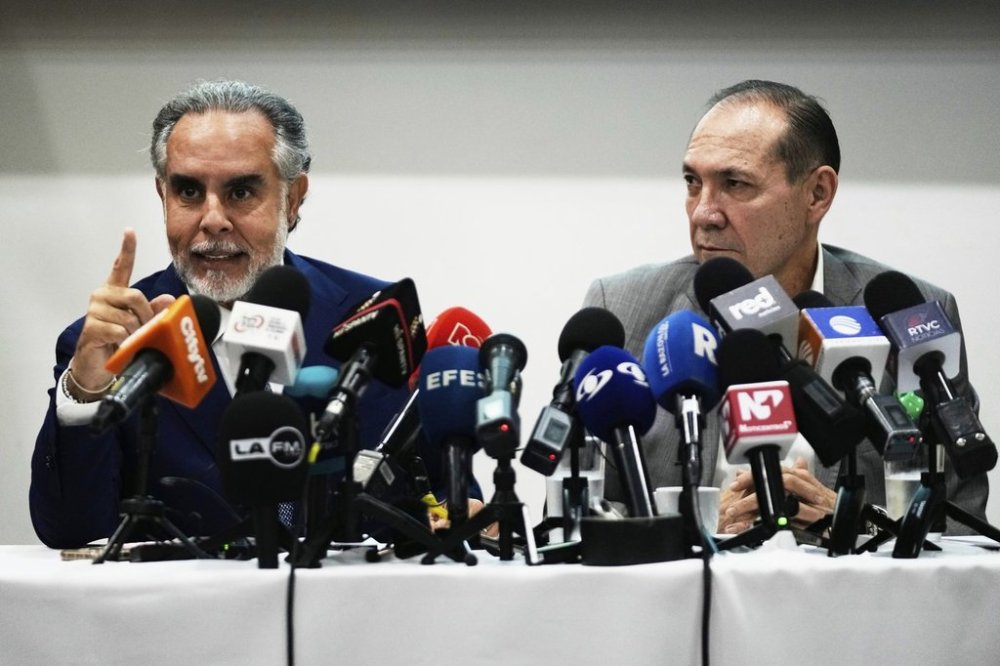Colombian government reveals questions it plans to pose to voters in referendum on labor reform
Advertisement
Read this article for free:
or
Already have an account? Log in here »
To continue reading, please subscribe:
Monthly Digital Subscription
$0 for the first 4 weeks*
- Enjoy unlimited reading on winnipegfreepress.com
- Read the E-Edition, our digital replica newspaper
- Access News Break, our award-winning app
- Play interactive puzzles
*No charge for 4 weeks then price increases to the regular rate of $19.00 plus GST every four weeks. Offer available to new and qualified returning subscribers only. Cancel any time.
Monthly Digital Subscription
$4.75/week*
- Enjoy unlimited reading on winnipegfreepress.com
- Read the E-Edition, our digital replica newspaper
- Access News Break, our award-winning app
- Play interactive puzzles
*Billed as $19 plus GST every four weeks. Cancel any time.
To continue reading, please subscribe:
Add Free Press access to your Brandon Sun subscription for only an additional
$1 for the first 4 weeks*
*Your next subscription payment will increase by $1.00 and you will be charged $16.99 plus GST for four weeks. After four weeks, your payment will increase to $23.99 plus GST every four weeks.
Read unlimited articles for free today:
or
Already have an account? Log in here »
Hey there, time traveller!
This article was published 22/04/2025 (192 days ago), so information in it may no longer be current.
BOGOTA, Colombia (AP) — Colombia’s government Tuesday published the contents of a proposed referendum on reform of the nation’s labor laws, that seeks to give employees greater access to health benefits and overtime pay. If approved, however, it could make it harder to create jobs in Latin America’s fourth largest economy.
The Ministry of the Interior published 12 questions that it plans to include in a national referendum, known in Colombia as a popular consultation. A date hasn’t been set for the referendum, which still requires approval from Colombia’s Senate.
The questions ask voters if they agree or disagree with reforms to Colombia’s labor laws, including requiring food delivery platforms to provide health insurance for freelancers and requiring companies to pay their employees double their daily rate when they work on Sundays.

Another question asks voters if “daytime work should go from 6 a.m. to 6 p.m.” implying that employees working outside those hours should be paid extra.
The government has previously proposed that companies pay employees a 35% bonus for any time worked outside regular daytime hours.
Business groups in Colombia oppose the reforms, arguing they will make it harder for small and medium enterprises to provide proper labor contracts to their workers, while encouraging them to hire people informally, paying them in cash. Trade groups have also argued that the government’s reforms do little to create new jobs.
“The government’s reforms do not recognize the reality of 16 million informal laborers and unemployed people in Colombia,” Jaime Alberto Cabal, the president of Colombia’s National Association of Merchants said in a video published on X.
The referendum will also ask voters if a special fund should be created to provide pensions to rural workers, and if companies should be obliged to hire “at least two people with disabilities for every 100 workers.”
In a speech on Monday, President Gustavo Petro said he will lead a march to Colombia’s Congress on May 1 to pressure legislators into giving the referendum a green light.
“It’s time for the people to make their own decisions” Petro said Monday in a nationally televised speech, where he argued that Colombia’s Congress has been trying to “deny the people” the right to decide their future.
The government’s push for a referendum comes as Colombia’s president fails to get the nation’s Senate to pass legislation on labor laws and health care, which are central to his economic agenda.
Petro is now trying to get around this impasse by getting some of his reforms passed by way of a referendum, a move that no Colombian government has tried before.
Political analysts say it will be tough for the president to get enough voters to support his proposals, even if they sound attractive for workers seeking more rights.
Under Colombian law, at least one third of the nation’s eligible voters must participate in popular consultations for their results to carry any legal weight. That means the proposed referendum would need approximately 13 million votes for its results to be implemented.
Petro won the 2022 presidential election with 11 million votes.
“There might be institutional actors, such as labor unions, who are very interested in this referendum” said Yan Basset a political analyst at Bogota’s Rosario University. “But their capacity to mobilize voters is limited.”
Basset said the referendum gives Petro a reason to mobilize his party’s bases, ahead of next year’s presidential election, giving the president’s party somewhat of an electoral advantage.
But if the referendum does not pass, it could also hurt the president, Basset said, because “the idea that he is representing the interests of the people” would lose credibility.

